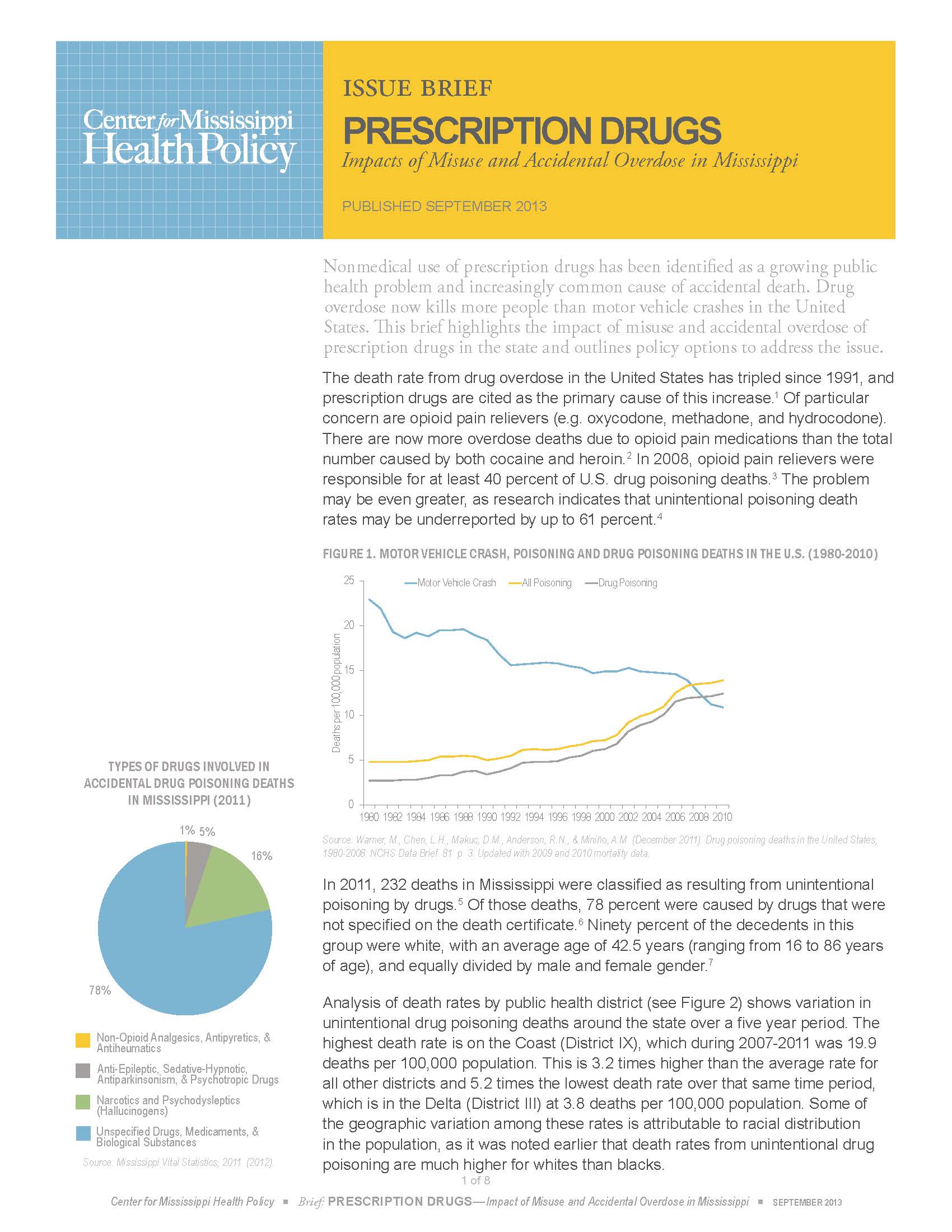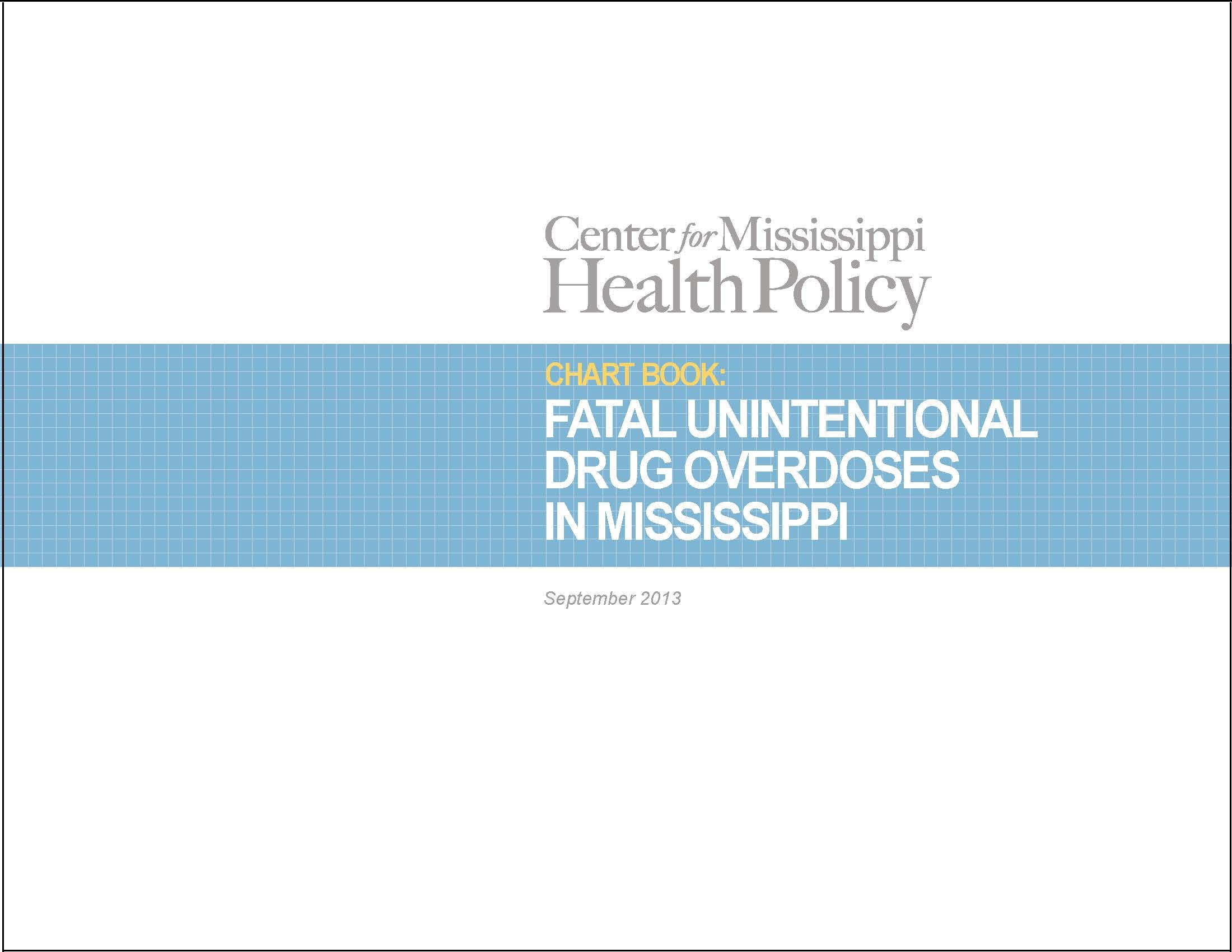Prescription Drugs: Impact of Misuse and Accidental Overdose in Mississippi
Thursday, September 19th, 2013

The death rate from drug overdose in the United States has tripled since 1991, and prescription drugs are cited as the primary cause of this increase. Of particular concern are opioid pain relievers (e.g. oxycodone, methadone, and hydrocodone). There are now more overdose deaths due to opioid pain medications than the total number caused by both cocaine and heroin. Drug overdose now kills more people than motor crashes in the United States, and shows a similar trend in Mississippi.
The Center for Mississippi Health Policy partnered with the Mississippi State Department of Health’s Office of Vital Records and the Mississippi State Board of Pharmacy’s Prescription Monitoring Program (MS PMP) to gather statistical data on controlled substance use for persons who died with a cause of death specified as an unintentional drug overdose. The project examined data from the two agencies’ systems in order to identify patterns that would help state officials better understand the problem and develop strategies to prevent overdose deaths.
The Center for Mississippi Health Policy has published an Issue Brief that provides background information on prescription drug misuse and accidental overdose, summarizes the findings from the study of drug overdose deaths, and outlines key issues and policy considerations associated with the problem. The Center has also developed a Chart Book that outlines the findings from the study of drug overdose deaths in more detail. Highlights from the Issue Brief are presented below:
KEY FINDINGS IN THE DATA MATCH PROJECT
Analysis of data related to the unintentional drug overdose deaths in Mississippi in 2011 revealed the following:
- More than half of those who died were younger than 45 years of age, with an average age of 42.5 years
- Nine out of ten were white
- The highest death rate (five-year average) is on the coast, which had a death rate 3 times the state average and 5 times the rate for the lower delta area

- Three-quarters of those who died in 2011 had records of controlled substance prescriptions in the MS PMP database with the following patterns identified:
- More than half (53%) of the prescriptions recorded in the MS PMP for this group were for pain killers with the next largest category being sedatives (37%)
- Controlled substance prescriptions for this group were written by 1 – 29 prescribers (average of 7) per person in the two years prior to death
- Controlled substance prescription drugs for this group were dispensed by 1 -19 pharmacies (average of 4) per person in the two years prior to death
POLICY CONSIDERATIONS
The National Governors’ Association recommends six strategies to address prescription abuse at the state level. These are discussed individually in the Issue Brief and listed below:
- Use prescription monitoring programs more effectively;
- Improve enforcement by coordinating operations, providing specialized training, and strengthening existing laws;
- Increase options for appropriate disposal of prescription drugs;
- Use the state’s role as regulator and purchaser of services to influence the delivery of care;
- Facilitate partnerships between key stakeholders; and
- Promote public education about prescription drug abuse.
Mississippi has established a Prescription Monitoring Program, passed regulations to require physicians to register with the MS PMP and to receive continuing education, conducted educational events to raise awareness and knowledge, and created provisions for appropriate disposal of prescription drugs. The MS PMP Advisory Board is an active body that represents a wide range of stakeholders and provides a practical venue for the coordination and collaboration necessary to address the complex issues involved. These efforts lay a strong foundation on which to make further improvements that can prevent deaths and reduce costs in the future.
Copies of the issue brief can be downloaded HERE. Copies of the Chart Book containing slides illustrating the findings of the study can be downloaded HERE. Printed copies of the issue brief are available by contacting the Center for Mississippi Health Policy at 601-709-2133 or by e-mail at info@mshealthpolicy.com.


